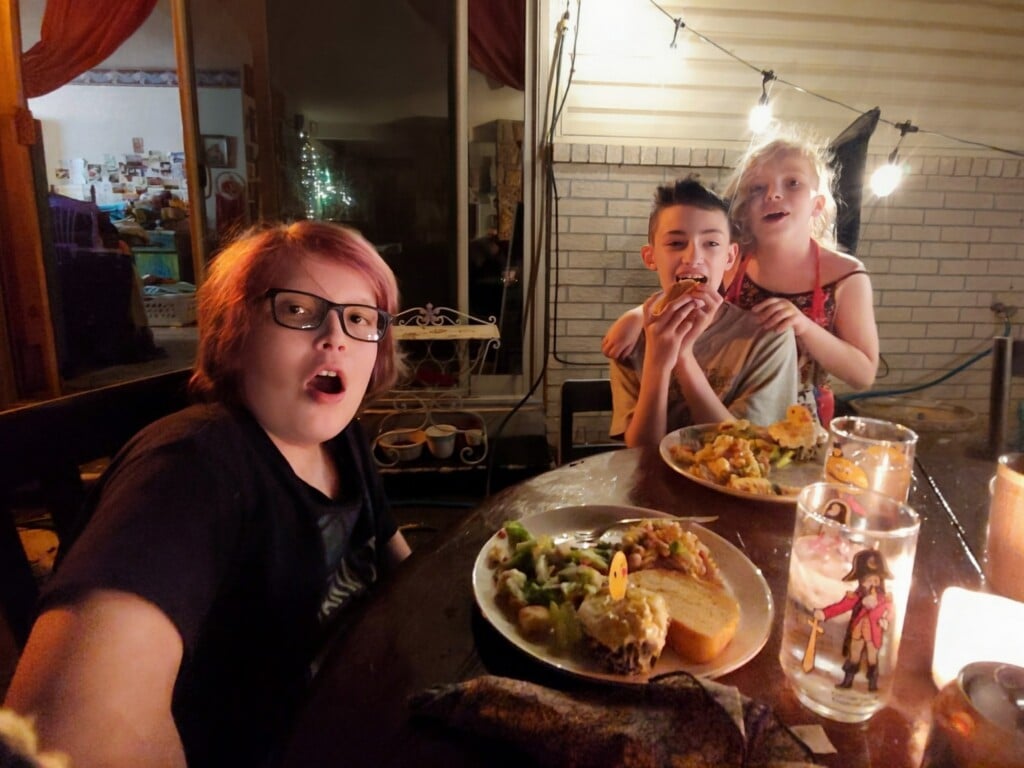One Mom’s Guide to SNAP, EBT, and the Shutdown

Between the local Tulsa parenting groups and my Facebook FYP, I’ve been seeing a lot of scared parents this week worried about how they’re going to make it through the holidays this year. Money has been tight for everyone — most of the folks I know haven’t seen a cost of living increase in their wages for years. My own rent and utilities have gone up more than 50 percent in the past two years, forcing us to fill most of our time outside of work doing even more work to make up the difference.
In the midst of all these struggle bus energy times, millions of American families are facing imminent hardship and food insecurity as the government shutdown threatens a looming halt to SNAP/EBT, the federal food assistance program. And unless something dramatic changes abruptly — which is always possible, especially in this current political climate, things are about to get bumpy for a lot of folks.
As someone in a family that has had to use SNAP/EBT in the past, I know how essential that help with food can be, and it hurts to see so many folks facing an uncertain period of food insecurity — especially in a time when grocery prices have seen a 29 percent increase since 2020 as rates continue to soar.
If this is coming as a shock to you, don’t let anyone make you feel bad for not realizing next month’s SNAP/EBT was in peril until just now. Not everyone is as tuned in to the workings of Washington as some of us CSPAN geeks out here, and that’s totally okay. At the end of the day, we’ve got lives to live, jobs to work, and kids to feed and raise.
But since it is good to have some sense of what’s happening and how you plan to navigate it, I’m going to try my best to answer some of your questions about the SNAP/EBT shutdown.
1. What do you know about SNAP/EBT?
My family has experienced a below-poverty income for our family size a few times through the years, generally due to cost of living increases outpacing any cost of living raises. We don’t need SNAP/EBT now, and I’m grateful for that, but I’m also glad to be able to draw on my experience to help other folks.
I also minored in political science in college, which means I spent a lot of time reading through legislation and getting drilled on how the federal government works. I won’t claim to be an expert or even right all the time, but I do have a pretty decent foundational understanding of how many government entities and programs work. And since I like it when other folks use what they know to help me out, I try to do the same thing when I can.
2. What is SNAP/EBT, and how is it funded?
SNAP/EBT is the same thing as Oklahoma EBT. The modernized version of food stamps, SNAP is a federally-funded program where the U.S. government sends money to each state to provide food for low-income families and individuals who would otherwise face food insecurity.
3. Who is on SNAP/EBT?
I’ve noticed some common misconceptions about who is eligible for SNAP/EBT getting tossed about on social media.
The first is that undocumented individuals are taking advantage of SNAP/EBT. Anyone who has actually been on SNAP/EBT should know this, but for those who don’t, it’s actually pretty hard to go through the process of getting enrolled, and part of that process is proving you are in the United States lawfully with documentation.
That means everyone receiving SNAP/EBT is either a U.S. citizen or a lawful permanent resident, asylee, or refugee. SNAP/EBT recipients are also required to reapply each year, and that application remains just as stringent with each renewal.
The second misconception is that people are on SNAP/EBT because they refuse to get a job. But in fact, most SNAP/EBT recipients who are able to work do.
Among those who do not work, the vast majority are either disabled or cannot work due to providing caregiving for their children or another family member. Many are also older individuals.
Why, then, must taxpayers pay for working individuals to get “free food,” you might be asking? It’s because these individuals are low-wage earners whose employers either refuse to or are unable to give an appropriate cost-of-living adjustment to mitigate the ever-increasing expense of living in the United States.
And in a time where a record number of Americans (nearly half at 44 percent, according to the Joint Center for Housing Studies) are struggling to make enough money to pay their rent, providing food help means keeping millions of kids from going hungry at night or having to wonder where their next meal will come from.
4. But aren’t some people committing SNAP/EBT fraud?
Yeah, absolutely. Anytime there’s a chance that someone could engage in some sketchy business, you already know there’s gonna be someone out there who gets on the trouble train. Heck, folks with sticky fingers are the reason I don’t buy makeup from Walmart anymore because it’s all locked up in the plexiglass product prison and truly, ain’t nobody got time to wait 15 minutes — the approximate time it took last time I needed contact lens solution — for an employee to show up and liberate your merch.
But what most folks don’t realize is SNAP/EBT fraud isn’t as widespread as you might think if you’re just getting your info from questionable sources on social media. A really good example of this is the TikTok poster who recently claimed she was raking in a nearly $12,000 a month EBT ticket. A lot of folks responded to this post — enough to make it go viral.
And that’s exactly what the page owner wanted because she’s a rage baiter, or someone who posts rage-inducing content knowing that folks will engage with that content and share it all over social media, ultimately making her money. She doesn’t care if you think it’s real or hate her guts for it — she only wants your engagement. And unfortunately, Facebook has its share of ragebaiters, too, because Lord knows we don’t have enough trouble working out what’s real or not with AI slop run amok (I’m looking at you, bears on trampolines videos).
Still, most of us anecdotally know of someone who made questionable decisions (and life choices) with their SNAP/EBT, and I certainly don’t think it makes anyone a bad person to feel awfully skeptical about benefits going to folks who take resources from our neighbors who could use more help. Straight up, that sucks, no bones about it.
But the reality is that, compared with the rates of appropriate usage, SNAP/EBT fraud is still exceedingly low (around 1 percent) — in fact, it’s practically nonexistent when compared to the fraud coming out of other agencies like the Pentagon.
I would also caution anyone against judging folks they see at the store with a nice car or a designer purse or with treats in their shopping basket. I’ve known folks who took their parents’ very nice car to shop for food because they didn’t have reliable transportation, and I’ve personally shopped on SNAP/EBT with a designer handbag that was given to me secondhand as a gift.
It’s also more than possible that someone purchased that car or purse before their job laid them off or they had to take a pay cut or that the car you think is valuable isn’t worth what you think it is. I also know there are a lot of kids who wouldn’t experience birthday parties or Easter and Valentine’s Day treats without SNAP/EBT.
And as a general rule, we could all do with a little more giving and sharing of grace and goodwill. I don’t know your situation; I only know that if my choice is between risking some jerk will rip off a couple of steaks so thousands of kids can have a decent meal, I’ll take that bargain any time.
5. What is your personal experience with SNAP/EBT?
As I mentioned above, my family has used SNAP/EBT a few times through the years as folks who generally sit on the low end of the middle class. My husband and I both work multiple jobs, and we’ve both worked hard and consistently our entire adult lives together. The only time either of us was technically out of work was when our kids were very little and we found it was cheaper for one of us to stay home while looking for opposite-schedule work than to pay for childcare, something I’m sure some of you all can relate to.
For us, having access to EBT meant having access to relief. When we were certain there would be food, we could eat somewhat healthy food rather than just buying highly processed high-carb food that tends to go further but isn’t as healthy for us in the long run. That also meant more fresh protein and more fresh meat, both things that you rarely find at a food pantry.
It also meant we could plan our meals better, which meant stretching our food budget further. When you’re getting $500 a month in food, which is around the highest amount we ever received with three kids, it’s not as scary to spend $150 on a basket of food that’s meant to last you a long time. That also means you can pick up larger packages, which helps stretch your food budget much further.
I’m not going to say for sure no one ever judged me for having EBT, but if they did, we apparently did not notice. More importantly, having that money available meant there was more money freed up for necessities like repairing a broken dryer or buying a much-needed pair of shoes for a kid.
6. Why is SNAP/EBT stopping?
This is the frustrating and complicated part, so buckle up. If your eyes glaze over anytime politics comes up, you can skip ahead to the last sentence in this section.
In the U.S. government, Congress has the Constitutionally-outlined “power of the purse” — in other words, they decide how our federal money is allocated. This is part of the checks and balances you learned about as a kid in school, and it keeps us from having to deal with excessive spending from our head of state like the French saw under King Louis XIV (AKA the “Sun King”), whose lavish spending included the gold-drenched Versailles palace and ultimately led to the bitter and bloody French Revolution and the rise of Napoleon.
That means that no other government agency or entity can spend money without it going through Congress first (unless we fundamentally change the Constitution).
Specifically, Article 1 of the Constitution outlines the power of Congress “To lay and collect Taxes, Duties, Imposts and Excises, to pay the Debts and provide for the common Defence and general Welfare of the United States.”
It goes on to state that “No Money shall be drawn from the Treasury, but in Consequence of Appropriations made by Law.” That means that until Congress has explicitly passed a law stating how the U.S. budget should be spent, no one, not even the U.S. president, can spend any money.
It goes on to outline that “All Bills for raising Revenue shall originate in the House of Representatives.” Since every bill has to go through both Houses of Congress, that means the budget starts in the House of Representatives, which has 435 members, and ends up in the Senate with its 100 delegates.
To that end, a new budget bill has to be passed each year by September 30 for the government to keep paying employees and funding federal programs like SNAP/EBT. Each budget includes mandatory spending (like Medicare, SNAP/EBT, and social security), discretionary spending (spending for various agencies and projects like highways, infrastructure, and medical research), and interest on our national debt.
Sparing the granular details, the federal budget process ends with Congress passing the finished product and the president then signing it into law.
While a few Senate decisions just require a simple majority — typically achievable with ease when one party controls the Senate like the Republicans currently do — closing the budget requires a vote of 60 (or ⅗ of the Senate), which means the majority party needs Democrats to get on board with their bill. The rule requiring this is called the cloture rule and dates back to 1917.
When both sides can’t agree, this is what’s known as a procedural filibuster. As mentioned above, this rule requiring 60 votes, or ⅗ of the the Senate, exists as part of our nation’s checks and balances to prevent the majority party from just doing whatever they want without considering the other side.
If an agreement doesn’t happen in time, the federal government is effectively shut down while the two sides are forced to work things out amongst themselves.
It’s not unusual to have a procedural filibuster — in fact, it’s actually the norm and has been for a long time. When it happens, both sides head to the negotiating table to hash out the details and rework the bill.
And even shutdowns are not uncommon, although they generally don’t last very long. We experienced the last serious shutdown in 2018 under Trump’s first administration. At the time, the 35-day shutdown was the longest in history and the most significant shutdown in decades.
Representatives from the Democrat side have made it clear they want to negotiate based on one issue: the ACA subsidies set to expire this year. As the bill stands now, those subsidies, which make it possible for lower-earning working class individuals to access healthcare on the ACA Market, will expire, causing insurance to skyrocket not just for them, but for the higher-paying folks as well since they’ll have to bear the brunt of insurance companies losing folks from the market.
The majority party has a mechanism to reopen the government and push the budget through, but it comes with long-term implications that neither party would likely want, hence its nickname the “nuclear option.” But it’s worth mentioning because if they feel they have to, the Republicans can choose to go nuclear.
In the meantime, millions of Americans including military folks, government employees, and regular families on SNAP/EBT are left bearing the weight of what is starting to feel a lot like a political game of chicken. Even if the Democrats agree to pass what’s known as the “clean CR” — that is, a continuing budget resolution passed as a temporary measure — those ACA subsidies will expire.
While the Republicans suggest this is no big deal and can be renegotiated later, months would pass between the subsidy expiration before that was even possible because new insurance premiums will already be set for 2026. The subsidies officially expire at the end of the year, with those expirations affecting millions of Americans — primarily those of us living in red states like Oklahoma and Texas.
Democrats believe that by allowing the budget to pass without those subsidies getting renewed, they will be cosigning what will amount to millions of Americans losing their healthcare and millions more paying potentially dramatically higher premiums. Since they have no power against a Republican majority in typical proceedings, they see this as their only chance to do anything to protect American healthcare.
I’ve heard a lot of chatter online about how the ACA isn’t perfect and these subsidies should be allowed to expire, but this is really a separate issue. Regardless of whether you feel that way about the ACA, regardless of what kind of insurance you have, these subsidies expiring will cause all of our premiums to go up. If you’re mad because you’re already paying $12,000 a year, you’re about to be madder when those ACA subsidies expire, according to analysts.
So why then, you might wonder, won’t the two parties just sit down at the table and negotiate? I think from the Republican perspective, the ACA just isn’t something they want to deal with.
Basically, they’ve said they will only pass the “clean” (meaning stripped down) continuing resolution because they see those ACA subsidies as something that was always set to expire. To them, there’s no basis for negotiation because they have no intention of continuing the subsidies. Case closed, I guess?
In other words, Congress is at an impasse and there is no sense that they’ll reconcile the two sides anytime soon, which means as of November 1, SNAP/EBT will no longer be funded.
7. Isn’t this really about giving free health care to undocumented folks?
I’m not sure where the talking point originated, but I’ve heard it all over social media and directly from Speaker of the House Mike Johnson.
Like SNAP/EBT, nobody can access market insurance subsidies without proof of legal documentation. I’m not discounting the possibility that someone could have a fake ID, but generally speaking, you have to be documented or a U.S. citizen.
However, there is a provision under U.S. law — the Emergency Medical Treatment and Active Labor Act (EMTALA) signed by Ronald Reagan in 1986 — that says hospitals can’t turn anyone away in an emergency. Basically, if someone is seriously injured or dying, this law exists to keep them from being forced out onto the street to literally just die there.
This law doesn’t exist in a vacuum, either. Apparently, at the time the law was passed as part of the annual budget reconciliation, there was a major problem with hospitals doing a thing called “patient dumping,” wherein a quarter of a million patients each year were transferred out of hospitals because they couldn’t pay for medical treatment.
Dark times, to be sure.
While hopefully most of us think it’s a good thing if you’re transferred to a hospital by ambulance unconscious and they can’t toss you out on the sidewalk to die because no one can find your Blue Cross Blue Shield card, this caused an unfortunate side effect. Providing health care costs money, and when someone can’t pay, the hospital would be forced to eat the cost, which meant, unfortunately, forwarding it to everyone else. To deal with that, today there are currently legal mechanisms in place to reimburse those hospitals for providing health care, with some of those mechanisms coming through the ACA.
In other words, even if those provisions expire, hospitals are still legally going to be required to provide healthcare to everyone in an emergency situation as outlined by that Reagan-era law. However, if those ACA mechanisms for payment to the hospital expire, that doesn’t mean anyone who isn’t paying will suddenly start paying. What it does mean is that those among us who can afford to pay are going to eat more of those costs through medical care rate hikes.
8. So is this the Democrats’ or Republicans’ fault?
Here, I can only give you my opinion, which is that I am not really sure how useful it is to assign blame and feel like we’re on the righteous side, and, realistically, I don’t think it does a lick of good to help the terrible situation we’re all in.
While working class folks are busy blaming their neighbors, I seriously doubt most of our politicians, regardless of party, are worried about skipping a meal or being able to visit a doctor next year.
In my personal relationship with Congress, I try (when possible) to divorce the person talking from the notion of political party and examine what that person is asking for or proposing. When either side tells me that “policy A” will take something from Americans or “policy B” will solve an important problem, I want to know the details. We’re not just doing “trust me, bro.”
When they start hammering down on the idea that anything is another party’s fault, that’s usually a red flag for me. These days, most of those folks are putting off more red flags than the Running of the Bulls.
This is 100 percent just my personal opinion, so please take it with a grain of salt. But I think it’s far more useful to focus on seeing past political party lines and focusing on community-level support for each other whether we’re wearing a MAGA hat or a rainbow flag.
Personally, I think we, the working and middle classes, have a heckuva lot more in common with each other than the folks sitting on Capitol Hill making decisions on our behalf, and I think if we actually started trying to see each other as neighbors again and working together to get past this ginned-up political division, we could actually get some Congressional folks to act on our behalf for a change.
9. Didn’t Trump say he would fund EBT anyway?
I’ve seen this one getting thrown around on Facebook quite a bit, too, and I think the confusion comes from folks confusing EBT with WIC. The Trump administration has stated that they would provide a $300 million infusion of tariff money into WIC, the program that gives families with young children and infants a certain amount of staple foods each month (things like milk and peanut butter). That’s a completely different program from EBT and won’t affect it.
It’s worth noting that WIC costs an estimated $7.2 billion per year to run, which comes out to about $600 million per month when divided by 12. I’m not really sure where the rest of the funding will come from or whether those cash infusions will continue if the stalemate persists, but I can see that the $300 million infusion amounts to half of what’s needed for the next month.
10. Can I use my leftover EBT next month?
If you’ve been hanging onto EBT bucks for a rainy day, there’s no guarantee you’ll be able to use them after November 1. Even the folks at Oklahoma’s Department of Human Services is unclear on this — they’re currently telling people who call in that even if they’ve got a balance on their account, they have no idea if it will be available after the 1st.
11. When will EBT restart?
If I thought I had the answer to this, I would go jump on one of those probability apps they were roasting on South Park and make enough money to buy all of y’all a fridge worth of food. But sadly, your guess is about as good as mine. I don’t know what will happen, and although I have some personal suspicions as to which way this will go before it’s over, I’ll just say we should probably just go ahead and expect it not to be available through the end of the year — in other words, expect the best but plan for the worst.
I wish I had something more hopeful for you, but it is what it is.
12. Should people just start a garden?
I am genuinely baffled by how many people are posting on social media that all of our SNAP/EBT problems would be solved if people would just grow their own food.
I say this as someone who does grow her own vegetables — that is, when they don’t get eaten by rabbits, voles, squashbugs, or those horrid little green bean looking evil Pokemon caterpillars that systematically destroyed my tomatoes this year. And I have a yard to grow food in, the time for growing as a remote worker, and the resources to do it (albeit apparently with a serious skills issue).
I can’t speak for everyone in the United States, but most regions don’t allow for year-round growth unless you’ve got a decent greenhouse and lots of potting materials. And even when you have those things, it takes money, time, and, sadly for me, skill.
You might be able to grow a few things, and for that matter, I think you should. If you live in Tulsa, as I do, the Tulsa City County Library even has a seed library to get you started and no, you don’t have to return them. Which is a good thing because I stay killing plants over here. But realistically, you’re just not going to feed a whole family on the food you grow year-round, especially if you have jobs and you don’t own a decent amount of property. And certainly, you’re not going to have enough food ahead of the shutdown.
13. Won’t food pantries pick up the slack?
Food pantries will help, but it won’t remotely be enough, especially given the number of food pantries that were forced to close after DOGE instituted dramatic cuts to federal domestic aid programs funding them earlier this year.
If those of us who can help donate what we can, that will certainly help stretch the food a little further. But it’s also worth noting that, as mentioned above, food pantries tend not to provide fresh produce or protein. Some food pantries also frequently give out out-of-date food, some of it moldy or well past the use-by date (by years in some cases).
Many food pantries also require recipients to come during the day, and it’s common for religious food pantries to require sitting through a religious service that can take hours. For folks with jobs, these requirements can be prohibitive.
But they can also be demoralizing and even degrading — I’ll never forget the time someone I know told me they spent an hour sitting next to an elderly man who had soiled himself through a religious service that went against his beliefs in order to get a box of outdated food that included severely moldy blueberries.
All that is to say that while the intention is good and food pantries are generally a good thing, they simply aren’t enough in terms of the bigger picture.
14. What else can I do to get by in the meantime?
I imagine a little of the creative spirit we all dug deep and found during the pandemic could go a long way in helping folks get through this tough time. For example, smaller families could eat communally with other families since it’s easier to stretch the food budget sometimes when you’re cooking in bulk.
As corny as it might sound, it’s also not a bad idea to check out some YouTube videos on cheap meals and depression-era food. We eat a lot of struggle meals at my house even when times are more prosperous since that just helps stretch the budget. Things like hot dogs and potatoes, spicy tuna mac, and French toast can go a long way in terms of feeding the troops and boosting morale when the food budget is waning.
15. How can I help others?
If you’re blessed enough to not need SNAP/EBT and you have enough resources to help other folks out, consider donating to the Oklahoma Food Bank. You can also give directly to families you know will be struggling or donate food through your local Buy Nothing Group or at the Really, Really Free Market.
If you choose to give directly, consider asking your recipients what types of food they actually need or prefer. It’s also worth noting that other staples — things like toilet paper and toiletries — can help take the pressure off the household budget so there’s more money available when folks need it for food.
Or consider making a whole meal and taking it to someone you know is having a tough time — just give them a head’s up before showing up with a whole casserole so you don’t accidentally cause an allergic reaction or bring something they can’t eat for medical reasons.
Hang in there!
This has been a long blog post, and I really appreciate those of you who made it this far! I hope I’ve been able to help you out with a few answers and maybe a little dash of hope thrown in there.
For me, my patriotism begins with the act of supporting my friends and neighbors where I can and not letting whatever mess they’re all stepping in up on Capitol Hill define how much love I have to give or who I give it to, and I’d like to hope some of y’all feel the same way.
All that is to say that we’ve made it through a recession, a pandemic, and the entire rise and fall of skibidi toilet, and we’re all still hanging in there together. So if you’re still reading, keep on truckin’ in your little nebula, and leave your favorite struggle meal or hard times recommendations below in the comments.












